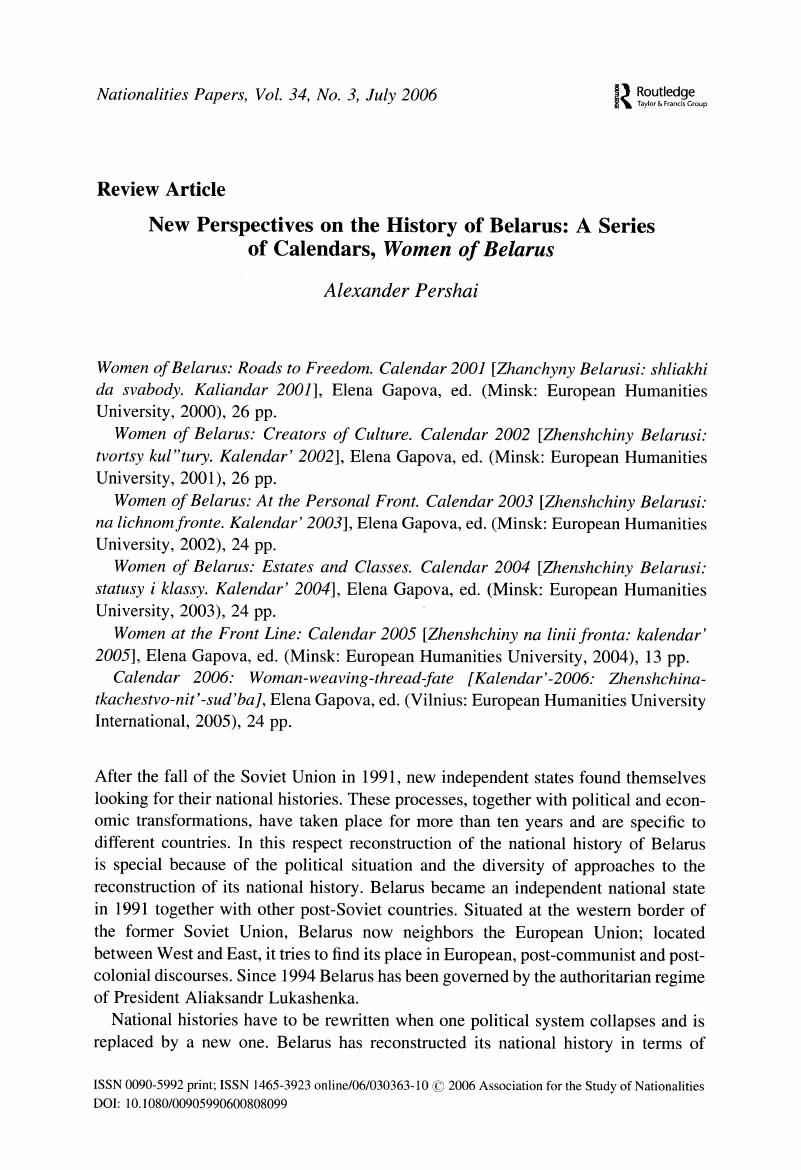No CrossRef data available.
Article contents
New Perspectives on the History of Belarus: A Series of Calendars, Women of Belarus
Published online by Cambridge University Press: 20 November 2018
Abstract

- Type
- Review Article
- Information
- Copyright
- Copyright © 2006 Association for the Study of Nationalities
References
Notes
1. See, for example, Elena Gapova, “On Nation, Gender, and Class Formation in Belarus … and Elsewhere in the Post-Soviet World,” Nationalities Papers, Vol. 30, No. 4, 2002, pp. 639–662.CrossRefGoogle Scholar
2. See Elena Gapova, “The Nation in Between, or Why Intellectuals Do Things with Words,” in Sibelian Forreser, Magdalena Zaborowska and Elena Gapova, eds, Over the Wall/After the Wall: Post-Communist Cultures through the East-West Gaze (Bloomington: Indiana University Press, 2004), pp. 65–87.Google Scholar
3. See, for example, Elena Gapova, Almira Usmanova and Andrea Peto, eds, Gendernye istorii vostochnoi Evropy (Minsk: Evropeiskii gumanitarnyi universitet, 2002), esp. Elena Gapova and Almira Usmanova, “Razmyshlenia na temy istorii i geografii,” pp. 5–11. See also Elena Gapova, ed., Zhenshchiny na kariu Evropy (Minsk: Evropeiskii gumanitarnyi universitet, 2003).Google Scholar
4. For details see the Centre for Gender Studies, European Humanities University in Minsk, <http://www.gender-ehu.org/?98_2> (accessed 6 June 2006).+(accessed+6+June+2006).>Google Scholar
5. Here I refer to a project and a slogan from Guerrilla Girls: “Do women have to be naked to get into the Met.[ropolitan] Museum?” 1989, <www.guerrillagirls.com/posters/getnaked.shtml> (accessed 12 April 2006).+(accessed+12+April+2006).>Google Scholar
6. Maggie Humm, “Memory, Photography, and Modernism: The ‘Dead Bodies and Ruined Houses” of Virginia Woolf's Three Guineas,” Signs, Vol. 28, No. 2, 2003, pp. 646–647.Google Scholar
7. For the critical revision of the applications of the category of gender in the post-Soviet context, see, for example, Serguel Oushakine, “Chelovek roda on: futliary muzhestvennosti,” Voprosy Filosofll , No. 7, 2005, pp. 34–56.Google Scholar




